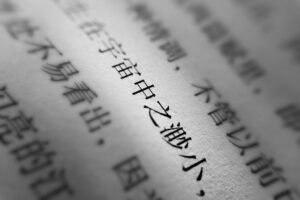Learning Chinese is a deeply rewarding journey, but like any language, it comes with its challenges. One of the most important aspects of mastering Mandarin Chinese is understanding and effectively using compound words. These combinations of two or more characters are essential for both everyday communication and more complex conversations. Compound words are a fundamental part of the Chinese lexicon, making them critical for anyone looking to achieve fluency.
If you are looking to strengthen your Mandarin skills and dive deeper into learning compound words, LC Chinese School in Oslo offers Mandarin classes in Oslo that are tailored to your needs. You can register for flexible and personalized classes with us here: LC Chinese School.
Table of Contents
ToggleWhat Are Chinese Compound Words?
In Mandarin, a single character often carries its own meaning, but when combined with one or more other characters, it can form a compound word with a new meaning. This combination creates a more specific term or concept, often simplifying what could be a more elaborate explanation if using single characters alone.
For instance:
- 老师 (lǎoshī): This word combines 老 (lǎo), meaning “old,” and 师 (shī), meaning “teacher.” Together, the compound word refers to a “teacher.”
- 电话 (diànhuà): Here, 电 (diàn) means “electric” and 话 (huà) means “speech,” forming the compound word for “telephone.”
Learning these combinations allows you to expand your vocabulary rapidly, and it provides you with the tools needed to navigate fluent conversations in Chinese. Since Mandarin relies heavily on homophones (characters that sound the same but have different meanings), compound words are especially important because they clarify meaning through context.
The Importance of Compound Words for Fluency
Mastering Chinese compound words is key to fluent conversation. While individual characters can convey meaning, they often lack context, which can lead to misunderstandings. Compound words, on the other hand, provide specific, nuanced meanings that make conversation clearer and more fluid.
In everyday life, compound words are unavoidable. Whether you’re discussing simple topics like the weather or more complex ideas such as technology or emotions, you’ll need compound words to express yourself accurately and efficiently. Moreover, understanding and using compound words allows you to sound more natural when speaking Chinese, as native speakers rely heavily on these word combinations.
If you’re looking to boost your proficiency in Mandarin, consider enrolling in a Chinese class in Chinese at LC Chinese School in Oslo, a premier Chinese language institute. Our classes offer an in-depth exploration of vocabulary, grammar, and pronunciation, including a focus on mastering compound words.
How to Learn Chinese Compound Words Effectively
Learning Chinese compound words might seem intimidating at first, but with the right strategies, you can build a solid vocabulary and start using compound words confidently in conversation. Below are some proven methods for learning compound words and incorporating them into everyday speech.
1. Build a Foundation with Basic Characters
Before diving into compound words, it’s essential to first build a strong foundation of basic Chinese characters. These characters are the “roots” that form compound words, so having a good grasp of their individual meanings will make it much easier to understand and memorize the compound versions.
Start by learning the most frequently used characters, such as those for common nouns, verbs, and adjectives. As you grow more familiar with these characters, you will begin to recognize their meanings in different compound words. For example, if you know that 水 (shuǐ) means “water” and 果 (guǒ) means “fruit,” it becomes easier to remember that 水果 (shuǐguǒ) means “fruit” (literally, “water fruit”).
Some basic characters you should master early on include:
- 日 (rì): day, sun
- 人 (rén): person, people
- 口 (kǒu): mouth
- 大 (dà): big, large
By understanding these individual characters, you’ll have an easier time when they appear in compound words. It’s also helpful to familiarize yourself with radicals, the components of characters that often indicate meaning or pronunciation.
2. Group Compound Words by Category
Learning compound words is much easier when you group them into categories. This helps reinforce connections between words and enables you to see patterns in how different characters come together to create meaning.
For instance, you could create a category for compound words related to transportation:
- 火车 (huǒchē): train (fire + vehicle)
- 飞机 (fēijī): airplane (fly + machine)
- 出租车 (chūzū chē): taxi (rent + vehicle)
By focusing on one category at a time, you’ll also improve your ability to engage in conversation about specific topics. You can also group words by themes like food, technology, or weather, which are common topics in daily conversations.
3. Focus on High-Frequency Compound Words
As with any language, some words are used more frequently than others. By concentrating on high-frequency compound words, you’ll be able to engage in everyday conversations more easily.
Here are a few high-frequency compound words you should start with:
- 谢谢 (xièxiè): thank you
- 明天 (míngtiān): tomorrow (bright + day)
- 认识 (rènshí): to know, to meet (recognize + knowledge)
- 工作 (gōngzuò): work (work + make)
These words are used in a variety of situations, making them indispensable for beginner and intermediate Mandarin learners. Focusing on these common words will allow you to quickly improve your conversational skills.
4. Use Spaced Repetition Techniques
One of the most effective ways to learn and retain Chinese compound words is through spaced repetition, a memory technique that involves reviewing information at increasing intervals. This technique helps commit words to long-term memory by reinforcing them just as you are about to forget them.
There are several apps and online tools designed specifically for learning Chinese that employ spaced repetition. Apps like Anki, Pleco, and Memrise allow you to create flashcards for individual characters and compound words, making it easier to keep track of your progress. By reviewing these words regularly, you can improve both your recognition and recall.
5. Practice with a Mandarin Language Teacher
While self-study is important, there is no substitute for working with an experienced Mandarin language teacher who can provide personalized feedback and support. A professional teacher can guide you through the nuances of pronunciation, usage, and context that are essential when learning compound words.
At LC Chinese School, our teachers provide structured lessons that emphasize real-life usage of compound words. You’ll have the opportunity to practice conversations, read texts, and write sentences that incorporate the words you’re learning. This hands-on approach ensures that you not only understand compound words but also know how to use them effectively.
6. Practice Creating Sentences
Once you learn a new compound word, it’s crucial to practice using it in context. Create your own sentences using the new word, and try to incorporate it into your conversations whenever possible.
For example, if you’ve learned the word 机场 (jīchǎng), meaning “airport,” try to create sentences like:
- 我明天要去机场。 (Wǒ míngtiān yào qù jīchǎng.) – “I’m going to the airport tomorrow.”
By actively using new compound words, you’ll reinforce their meanings and improve your confidence in using them during conversations.
7. Engage in Conversations
To become truly fluent, it’s essential to practice speaking Chinese regularly. Whether through language exchange partners, online tutors, or in-person classes, frequent conversation practice will help you integrate compound words into your everyday speech.
Look for opportunities to engage in dialogues where you can apply the vocabulary you’ve learned. At LC Chinese School, we offer Mandarin classes that emphasize spoken interaction, helping students apply new vocabulary in real-world scenarios. Our instructors create a supportive environment for students to practice and improve their conversational skills.
8. Watch Chinese Media for Context
Listening to native speakers use compound words in context is one of the best ways to reinforce what you’ve learned. Chinese TV shows, movies, and news programs are excellent resources for hearing compound words used naturally. As you listen, try to pick out the compound words and pay attention to how they fit into the conversation.
Subtitles can also be a valuable tool in this process. Watching Chinese media with both Chinese and English subtitles helps you identify compound words and understand their meanings more clearly. Over time, this exposure will help you incorporate these words into your own conversations.
9. Enroll in an Online Class in Chinese
If you’re unable to attend in-person classes, you can still benefit from structured learning by enrolling in an online class in Chinese. Online classes offer the flexibility of learning from home while still receiving personalized instruction from experienced teachers.
At LC Chinese School, we offer online classes in Chinese that cater to a range of skill levels. Our courses are designed to help students build strong language foundations, including a focus on mastering compound words for more fluent conversations.
Strategies for Retaining Compound Words in Conversations
Once you’ve begun learning compound words, the next step is to make them an active part of your conversations. Here are some strategies to help you retain and use compound words effectively:
- Repeat New Words Regularly: Repetition is key. Regularly review and repeat new compound words to commit them to memory.
- Use Visual Aids: Associating words with images can help reinforce their meanings. Use flashcards or visual apps to keep track of compound words and their definitions.
- Apply Words in Different Contexts: Don’t limit your practice to one type of conversation. Try using new compound words in various settings to solidify their meanings.
- Write Down New Sentences: Practice writing sentences in Chinese to reinforce compound word usage in both writing and speaking.
By combining these strategies, you’ll find that you can recall and use compound words more naturally in conversations.
Conclusion: Mastering Compound Words for Fluent Mandarin Conversations
Learning Chinese compound words is an essential step toward achieving fluency in Mandarin. These word combinations not only expand your vocabulary but also allow you to express complex ideas clearly and naturally. Whether you are a beginner or an advanced learner, mastering compound words will enhance your ability to communicate effectively.
At LC Chinese School in Oslo, we offer a range of Chinese courses designed to help you develop your language skills, including a special focus on compound words. Our experienced teachers will guide you through every step of the process, from building a foundation with basic characters to mastering compound words for everyday conversation.
If you’re ready to take your Mandarin to the next level, register today at LC Chinese School and begin your journey to fluency!







